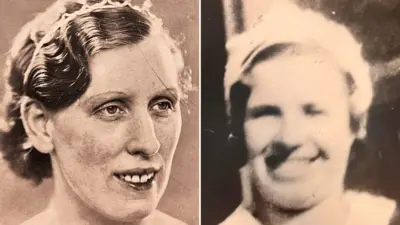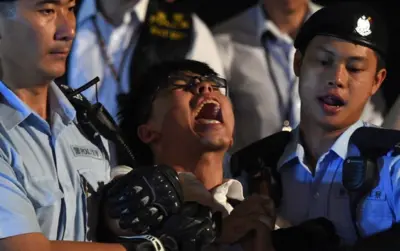We've updated our Privacy and Cookies Policy
We've made some important changes to our Privacy and Cookies Policy and we want you to know what this means for you and your data.
Four 'stand your ground' cases in the US
Image source, Thinkstock
The death of Trayvon Martin has thrown a spotlight on Florida's controversial Stand Your Ground law, which grants individuals wide latitude to use deadly force if they feel seriously in danger.
The provision is backed by America's powerful gun lobby, but critics say it creates a Wild West legal environment in which people can kill one another without fear of prosecution.
With George Zimmerman facing a second-degree murder charge over the 17-year-old's fatal shooting, what are the chances of a conviction?
Here are four previous cases in Florida where killers were freed after citing Stand Your Ground:
Bullied teen fights back
In January 2011, Jorge Saavedra, then 14, stabbed to death 16-year-old Dylan Nuno in Collier County, Florida.
Dylan was two grades ahead of Jorge at Palmetto Ridge High School, and he and his friends had been bullying Jorge for months, taunting him with homophobic slurs and throwing spit balls at him.
The day of the killing, Dylan followed Jorge off a school bus and attacked him from behind. Jorge tried to escape, then pulled out a knife he had brought to school in anticipation of a confrontation and stabbed Dylan in the abdomen.
He was initially charged with manslaughter but was cleared of wrongdoing in January 2012.
A judge ruled he had reason to believe he was in danger of death or serious injury, and noted he had tried to escape even though the law did not require him to.
A gang shoot-out
Image source, Florida Department of Corrections
Michael Jackson, 15, was shot in the face and killed during a shootout between two groups of warring gang members in front of a Tallahassee apartment complex in February 2008.
The feud between the two groups began outside a cafe, when Jamal Taylor threw a bullet at a member of a rival gang. The action was perceived as a challenge, and later the two groups met again in the driveway of an apartment complex.
Jeffrey Brown said he had gone to the complex to see his girlfriend, but finding her not at home, he returned to his car where he found Andrae Tyler holding an assault rifle in his lap in the backseat of his car.
As they were leaving the apartment complex, Jamal Taylor, Michael Jackson and others entered the complex in a caravan of vehicles. A shootout ensued and Jackson was killed.
Brown and Tyler were granted Stand Your Ground immunity in the case. Taylor did not pursue the self-defence claim, according to a local media report. He was convicted of manslaughter, and served just over a year in prison.
Judge Terry Lewis found that under Florida's gun laws, Brown and Tyler were legally allowed to possess the rifle, which was not concealed; neither were engaged in an unlawful activity before the shootout; and both had a legal right to be at the complex.
In a decision, Judge Lewis criticised the Stand Your Law even as he applied it.
He said the men had all been spoiling for a fight, both groups were armed, and none took precautions to avoid a gunfight.
"Two individuals, or even groups, can square off in the middle of a public street, exchange gunfire, and both be absolved from criminal liability if they were reasonably acting in self defence," he wrote.
"The law would appear to allow a person to seek out an individual, provoke him into a confrontation, then shoot and kill him if he goes for his gun."
A boat sale gone bad
Image source, Palm Beach County Sheriff
Raymond Mohlman, 49, and Matthew Vittum, 43, were shot to death by Michael Monahan, 65, after an argument on his sailboat near West Palm Beach in April 2011.
Mr Monahan had purchased the boat from Mohlman but had yet to register it in his own name. The boat had been written up for $500 in citations that had thus accrued to Mohlman, a former lifeguard, teacher and wrestling coach, police said.
Mohlman and Vittum, who were intoxicated, confronted Mr Monahan on the boat. An argument ensued and Mohlman and Vittum cornered Mr Monahan in the cabin, police said.
Mr Monahan said he fired his gun at them because he feared for his life, though the men were unarmed, he acknowledged they had not touched him, and Mohlman was in fact the boat's legal owner.
After the shooting, Mr Monahan tried to flee in a kayak, police said.
Initially charged with murder, Mr Monahan was set free by a judge before the case went to trial.
Judge Richard Oftedahl ruled Stand Your Ground did not require that the men actually be armed or commit physical violence for Mr Monahan to have a reasonable fear that they would either kill or severely harm him.
Mr Monahan had been living in the boat for about six months, he noted.
A deadly dockside fight
Michael Palmer, a 23-year-old construction worker, got into a fight with Timothy McTigue, 44, on a boat dock in South Florida in May 2007.
The two, who were strangers, were on the dock when the intoxicated Palmer made derogatory comments about Mr McTigue's girlfriend, the Fort Lauderdale Sun-Sentinel reported, citing court documents.
The men exchanged words and the spat escalated into fisticuffs. The men fell into the water and Mr McTigue said Palmer had tried to drown him.
Mr McTigue retrieved a handgun and shot Palmer in the side of the head as Palmer hoisted himself on to the dock.
Palmer's friends told investigators they had been drinking all day, Palmer had been taunting other strangers earlier and that they had warned him not to start fights.
Mr McTigue was charged with murder - prosecutors said Palmer had retreated from the fight - but was acquitted in a jury trial.
Top Stories
More to explore
Most read
Content is not available








